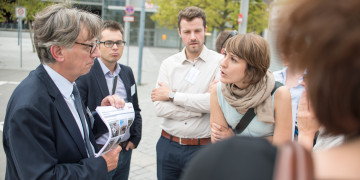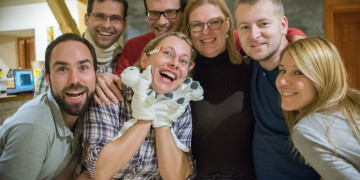Sudetenland in the north of Moravia / Silesia
Interview with Zuzana Válková, journalist, CGYPP participant 2010/2011.
You have recently published the article on the social development of Sudetenland in north of Moravia/ Silesia – the area that faces social and political obliviousness. From your perspective, is this general development of former Sudetenland? Why is it happening?
I would not aspire to try and offer a general prediction for the entire region, which once occupied, by a broader definition, almost a third of the total area of former Czechoslovakia. I will rather come up with a personal observation. I think one of the reasons the region sinks into oblivion, as you say, is connected to the decades lasting, first bloody, and then resourcefully repressive ways of eliminating local élites – Czech, Jewish, German and all those coming after them. The politics of forced egalitarianism went on and on for almost fifty years; the Communists were highly instrumental in ruining the last bits of, say, organic social and political structures surviving the war. This societal purification had been so extreme that it left Sudetenland paralyzed and ready for harvest by early capitalist raiders who discarded it as an almost empty shell with little chance of restoration. In my view, that is one of the reasons “Sudetenland” appears mute now. Whoever has the capacity to speak up or to care, leaves. I cannot blame anyone, it’s my story, too; I left when I was thirteen.
Is the issue of „looking back“ in the Czech-German relations over? Or simply no one cares?
I would not necessarily connect the two things, although obviously Sudetenland is a symbol of many unresolved, painful issues, which should have been addressed decades ago. Another acquaintance of mine, a former diplomat positioned in Germany, said the last – although informal – chance we, the Czechs, had of relating in a civilized way to the horrors of expulsion of Germans was around the year 2000. After that, our German partners “lost serious interest in discussing it” and the Czechs returned to their banana eating and diplomatic trees they came from.
I think, however, that in my generation the situation is changing. People around me are aware they benefit from impartiality only time and distance from the war can bring. Therefore, I would not be so pessimistic; I do believe we will live to see a generation of younger politicians who will not make empty statements about the past but actively work with what has shaped the relations between the two countries. There are some who are doing that already. I am trying to play my tiny part, too.
Looking at public opinion surveys, it seems that the positive picture of Germany has been ruined. Is it all about refugees or the history plays its role?
I have not seen the surveys you mention, therefore I can only speculate what may have been the cause such results were recorded. And I would be careful to distinguish between “Germany and the people living there” and “its political representatives, particularly Chancellor Merkel”.
I refuse to believe the Czechs are anti-German now. I do believe, though, that the media have had a huge impact in shaping Czech perception of current German politics related to migration. After what some major Czech media did to the topic, I am not surprised. It has acquired such ideological charge people got lost in translation. In a situation when you are only confronted with “A” as opposed to “Z” – and nothing in between is valid – I personally surrender.




